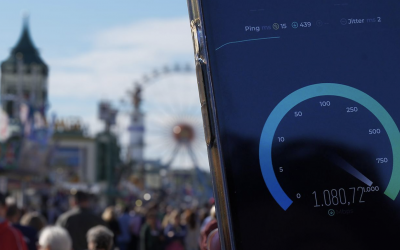G DATA study shows: economy too rarely exploits the full potential of artificial intelligence
Only 46 per cent of German employees use artificial intelligence (AI) such as Chat GPT or DeepL for their daily work. This is shown in the current study ‘Cybersecurity in Figures’ by G DATA CyberDefense AG, Statista and Brand eins. The use of AI offers companies many opportunities, for example, to automate processes and thereby save costs. Artificial intelligence will significantly change the world of work in the future. More than half of the respondents already believe that AI will take over up to a quarter of their daily work in the next five years.
Many companies can no longer imagine life without AI systems. Automated data analysis and translation into other languages are two examples of how artificial intelligence is used. However, this development is far from being common knowledge among all employees, with only one in five employees using an open application, including Perplexity or Chat GPT. 11 per cent of respondents rely on in-house AI solutions for their work and one sixth work with both open and internal systems.
‘Integrating AI into business processes offers enormous opportunities for remaining competitive and achieving long-term success. It is important that companies check which processes can be made more efficient by using AI. At the same time, clear guidelines on data security and data protection must be issued to ensure that the new technologies are used responsibly,’ explains Andreas Lüning, co-founder and CEO of G DATA CyberDefense AG.
Future expectations: AI as a potential game changer
Although many employees currently work without AI, a look into the future shows a growing awareness of the technologies: More than half (52 per cent) of the respondents in ‘Cybersecurity in Figures’ assume that up to 25 per cent of their daily work will be taken over by artificial intelligence in the next five years. It is conceivable that bookkeeping, documentation and even medical diagnoses could be carried out automatically. A further 24 per cent of respondents expect that half of their tasks will be automated by AI. However, the proportion of employees who expect an even higher proportion of their work to be taken over by artificial intelligence remains low at seven per cent. Only one-sixth of respondents believe that AI will not take over any of their tasks in the next five years.
The discrepancy between current usage behaviour and future expectations shows that many companies are not yet prepared for the challenges ahead. Companies are therefore called upon to make the necessary investments and to adequately involve their workforce through training. In doing so, not only security aspects but also legal requirements – such as the EU Artificial Intelligence Act – should be taken into account. This enables productive work with AI within a legally secure framework.
Cybersecurity in Figures to Download
‘Cybersecurity in Figures’ is now in its fourth edition and is characterised by a high density of information and a particularly methodical depth: Statista’s market researchers have compiled facts and figures from more than 300 statistics into a unique compendium. More than 5,000 employees in Germany were surveyed as part of a representative online study on cybersecurity in a professional and private context. Statista’s experts closely monitored the survey and, thanks to a sample size that far exceeds the industry standard, are able to present reliable and valid market research results in the magazine ‘Cybersecurity in Figures’.



